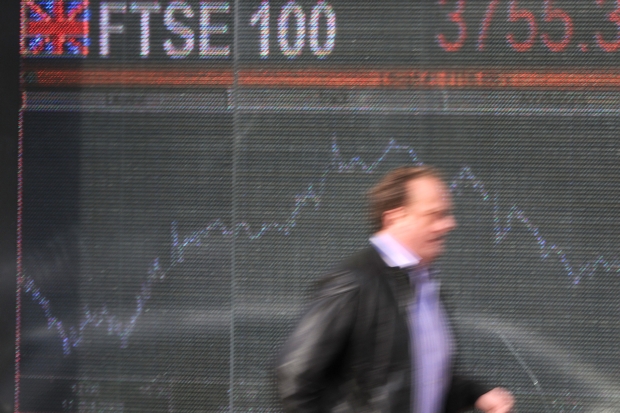It is four o’clock on Friday morning. The early returns suggest Leave is edging ahead. You’ve just seen a tweet that Peter Mandelson has fled the country, and that Boris Johnson has been seen pencilling in the names of his cabinet. What is the first thing you do? Rush down to Sainsbury’s and stock up on olives before they get banned? Text that Polish builder for some final painting and decorating before he gets sent home? Perhaps. But actually what you should do is very simple. Get on the phone to your broker, or more realistically go online, and get ready to start buying the FTSE, the pound, and every other British asset you can lay your hands on.
The City has convinced itself that Britain leaving the EU would be an economic catastrophe, as bad, if not worse, as the collapse of Lehman Brother eight years ago. The stock market will be down 20 percent to 30 percent. The pound will drop 20 percent, perhaps hitting parity with the dollar. Gilts will be destroyed. It may well trigger a global crash to match 2008 and possibly worse. Why, exactly, investors worldwide think it is so important is actually quite hard to work out. The UK accounts for about 3.5 percent of global GDP. Our exports to the EU account for about 14 percent of our output, so even in the worst case scenario, in which British goods are completely banned from the rest of Europe, only about 0.5 percent of the global economy will be at risk. That’s a rounding error, not a major event.
On Friday, however, that won’t matter. If we leave, the markets will panic, and prices will collapse. The only rational response to that will be to start buying. Why? There are three reasons.
First, a massive devaluation of the pound, which is what will happen, is actually helpful for the economy, especially when you have a massive trade deficit, which as it happens we do. Our stuff will get a lot cheaper for the rest of the world, and – surprise, surprise – they will buy more of it. It is going to annoy the hell out of the CBI, but ironically the collapse in the pound means our exports to Europe will probably go up after we leave the EU, not down.
Second, the Governor of the Bank of England Mark Carney has virtually promised to step in to calm the turmoil. Interest rates will be cut, probably all the way down to 0 percent. There may be an extra blast of quantitative easing, especially if there are signs of any of the major banks running into trouble. Whether that is wise or not will be an issue for another day. What is unquestionably the case is that lower interest rates and QE will stimulate the economy. People will have more money and debt will be cheaper, so the British will do what they always do when that happens – which is drive up house prices and max out their credit cards. Maybe that isn’t helpful in the long-run, but in the here and now it will boost the economy.
Finally, all the Project Fear nonsense will quickly be exposed for what it is – nonsense. Amid all the hysteria of the last month, the actual truth about the EU is that is largely irrelevant to the UK economy. It is especially irrelevant to the big global companies that make up the FTSE. Does anyone really think GlaxoSmithKline or BP is suddenly worth 30 percent less because the country in which they happen to be head-quartered is no longer a member of a trade bloc with which they do relatively little business? That is just silly. Those companies will sail forward as if nothing has happened.
The time to buy the market has always been when there is blood on the streets. On Friday morning, if Leave pulls ahead in the national vote, the blood might be metaphorical, but there will still be carnage in the markets. But they have got plenty of stuff wrong in the past, and they are getting this upside down as well. The UK economy will be just fine either way – and if there is a wave of selling, it is time to buy.






Comments